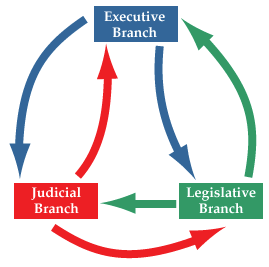The Bill of Rights is Missing an AmendmentBy Brent Smith April 23, 2018 I describe this phenomenon as such, owing to the fact that three branches of government are no longer “separate but equal.” As we see by the take-over of government by the federal judiciary, they are clearly the most powerful of the three. The other two branches, the legislative and executive, take to bended knee before them, and as blind mutes, comply with any and every decree. This was clearly not intended by the founders. However, this cross-delegation can more accurately be described not as a seizing of power and authority of one branch from another, but as a voluntary giving of authority of one branch to another. The legislative branch, devoid of backbone, consistently surrenders its constitutionally mandated authority to the executive branch, giving the President authority he is not entitled to. Unfortunately, as is often the case today, the three branches of government see the Constitution as nothing more than a conglomeration of gray areas to be interpreted as they wish. National Review described it as the “disalignment of the various branches of government relative to what the Framers of the U.S. Constitution intended.” The Constitution does specify the duties of the three branches and assumes that the branches would have the fortitude to carry out their specific duties. They apparently did not envision such a large collection of spineless weasels, eager to give their authority away rather than having to make hard choices. These supposed gray areas in the Constitution are exactly the reason why the anti-federalists insisted on spelling out a set of basic individual rights in the Bill of Rights. Fulfilling a promise to anti-federalists like George Mason, Patrick Henry, and Samuel Adams, James Madison introduced his proposed nine amendments on June 8, 1789. The amendments were taken up by the House, and on August 24, the House voted in favor of presenting 17 amendments (first draft) to the states for ratification. Congress then forwarded the proposed Bill of Rights to the Senate. The Senate reduced those 17 to 12 (second draft) and on September 28, 1789, these 12 were submitted to the States for ratification. The process slowed to a crawl, which for something this important was the right tact. Finally, on December 15, 1791, the remaining 10 Amendments were agreed upon by three-quarters of the States and the Bill of Rights was born. However, in retrospect, there was one original Article that is desperately needed in today’s three-branch free-for-all environment. Sadly it ended up on the cutting room floor – didn’t make it past the second draft. This was Article 16, which read: “The powers delegated by the constitution to the government of the United States, shall be exercised as therein appropriated, so that the legislative shall never exercise the powers vested in the executive or judicial; nor the executive the powers vested in the legislative or judicial; nor the judicial the powers vested in the legislative or executive.” This one Article – this one short paragraph, would bring the entire federal government back into Constitutional alignment. The intent of this Article, or Amendment, could not be clearer – that no branch shall ever exercise another’s power, even if voluntarily surrendered to another. This one Article would put an end to the cross-delegation of authority, or “disalignment of the various branches of government.” It should be considered as the 28th Amendment to the Constitution.
| ||||
 Brent Smith, "The Common Constitutionalist," offers not just conservative commentary and analysis, but a blend of politics, history, arts, science, and humor. Whoever said conservatives aren’t funny? Yeah, I know…most people. Brent is a contributing writer for numerous online publications. When he is not burning the midnight oil writing his insightful commentaries, he is raising his two teenage sons to be patriots and Conservatives. Brent Smith, "The Common Constitutionalist," offers not just conservative commentary and analysis, but a blend of politics, history, arts, science, and humor. Whoever said conservatives aren’t funny? Yeah, I know…most people. Brent is a contributing writer for numerous online publications. When he is not burning the midnight oil writing his insightful commentaries, he is raising his two teenage sons to be patriots and Conservatives.Visit Brent Smith's website at www.commonconstitutionalist.com
|

